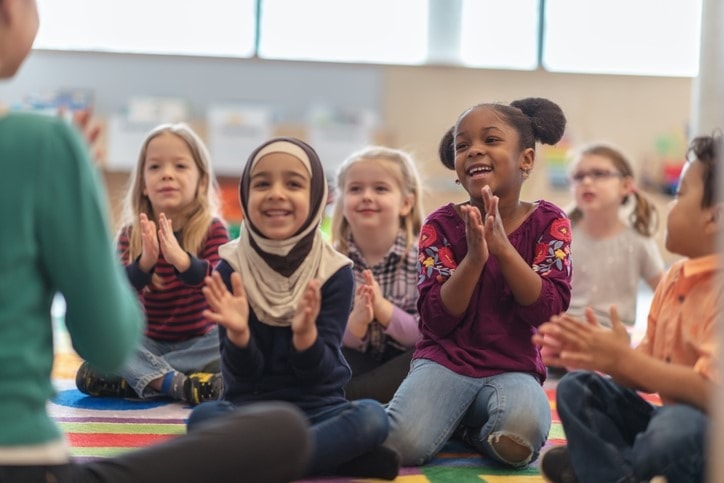/ News Posts / General Music to Overcome Challenging Times
General Music to Overcome Challenging Times
Creating a Trauma-Sensitive Learning Environment
By NAfME Member Edward Varner, Ed.D.
This article was first published in the April 2021 issue of Journal of General Music Education (formerly General Music Today).
It seems fair to say that all of us, students and teachers alike, have navigated a shared traumatic experience of historic proportions. Many teachers and students are suffering significant stress and uncertainty this year amidst a global pandemic and violent, racially charged, political and civil unrest. We are experiencing strong emotions and divisiveness at the national level that can often make normal life feel uncontrollable, even high-risk. Student responses may quickly move from anger to euphoria. The purpose of this column is to provide a germane awareness for teachers to help them better align with Social and Emotional Learning (SEL) objectives and create trauma-sensitive general music learning environments during these challenging times. It is, after all, our responsibility as caring, professional educators to create safe, predictable settings for children to be, learn, and grow. This can be achieved by committing to the creation of SEL Informed/Trauma-Sensitive General Music Learning Environments in which each student is healthy, safe, engaged, supported, and challenged.
What Is Trauma and What Is a Trauma-Sensitive Learning Environment?
Social and Emotional Learning and Trauma Informed practices are tools educators can use to help students develop social and emotional competencies in order to better navigate life’s challenges. The Collaborative for Academic, Social, and Emotional Learning (CASEL) has identified five key social and emotional competencies as the foundation of SEL practices: Self-Awareness, Social-Awareness, Relationship Skills, Self-Management, and Responsible Decision-Making (CASEL, 2020). The competencies provide a general framework for helping students develop skills and build awareness. They can also be used as an effective way to better meet the needs of those students affected by traumatic life experiences. SEL Informed/Trauma-Sensitive practices could be helpful in the successful delivery and implementation of quality music programing while helping to solidify the importance of music as a tool to improve the lives of people. To be precise, music can be used as a tool to open the door to a global citizenry and help to eliminate the worst enemies of humankind: ignorance and prejudice.
Rice and Groves (2005) explained that “trauma is an exceptional experience in which powerful and dangerous events overwhelm a person’s capacity to cope.” However, an experience does not have to be life-threatening to trigger a trauma response. Students who have been exposed to trauma and/or toxic stress are more likely to struggle with academic success. Additionally, trauma happens across all communities and cultures. It does not discriminate (Soures & Hall, 2016).
An SEL Informed/Trauma-Sensitive learning environment is a classroom, general music room, band/choir room, stage, practice field, art studio, dance studio, or any other learning space in which each student is healthy, safe, engaged, supported, and challenged. The general music classroom can easily be that space for students.
Five Important Facts about Trauma
- Student and adult trauma is real.
- Student and adult trauma is more prevalent than we would like to admit.
- Trauma is toxic and affects development and learning.
- General music teachers need to be prepared to support students who have experiences with trauma, even if we do not know who they are.
- Children are resilient. Within a positive learning environment, they can grow, learn, and succeed.
Our Beliefs Can Make All the Difference
In order for us to positively influence our students, we must be clear about what we believe about childhood trauma and our role in supporting the healthy development of our students. It is important that, “as professionals in a caregiving field, we must be attuned to our belief systems” (Soures & Hall, 2016, p. 134). Healthy, productive human beings and healthy human relationships are characterized by imagination, free flowing, spontaneous conversations, connection and vulnerability (Feinberg, 1995; Brown, 2012). As important members of our school and community, if we are not listening and remain unaware of our own beliefs, we cannot help foster the growth of healthy individuals. We instead become part of the problem.
We Shall Overcome
The National Association of School Psychologists report that “stressors and trauma can affect functioning in daily life” (2020). They further describe how students experiencing stress and adversity can exhibit both internal symptoms (anxiety, depression, grief, fear, anger, and isolation) and external behaviors (reactivity, aggression, and behavior problems). Our students may be stressed about actions or statements that they hear or see in the news. Traumatic events in their communities or reported in the media may cause students, and teachers, to fear that they or their family and friends may be “targeted because of their gender, race, cultural or religious background, sexual orientation, or immigration status” (National Association of School Psychologists, 2020). Now might be a good time for general music teachers to align today’s struggle to those of the past as a way to assure students that they too can overcome these challenges.
“We Shall Overcome” is an American anthem. The first modern version of the song is believed to have been sung by striking tobacco workers in Charleston, South Carolina, in 1945. The song became an anthem of the civil rights movement of the 1960s and was popularized by folk singer, Pete Seeger (Hine, Hine, & Harrold, 2014). It has been through many changes, moving from the upbeat gospel tune, “I’ll Overcome Someday” to the prayerful “We Shall Overcome.” It has been used to inspire people all over the world as well as here in America.
There are many ways in which music teachers can use the song “We Shall Overcome” to inspire students to better endure challenging times. Since this column will be published during the pandemic, I will not be suggesting group singing. I will, however, encourage teachers to continue to use the power of song to bridge gaps of understanding. I suggest the following strategy to harness a little bit of that power:
- Obtain a good recording of “We Shall Overcome.”
- Listen to the song with your students. Encourage students to take in as much as possible—text, melody, harmony, accompaniment, etc.
- Ask students to list five words or phrases about any aspect that they notice.
- Repeat steps two and three again and try to come up with five more words.
- Fun Addition—Using whatever small percussion or hand drums that are available, create a rhythm “groove” to accompany the recording—think drum circle activity. No singing will be necessary and the text will speak loudly on their own.
Music educators fill a particularly vital role in the lives and education of students. They inspire and encourage them to find their voice, empower independence and confidence, and develop a collaborative spirit. Music teachers are trusted mentors who purposefully create opportunities for students to find success as people. As we all navigate these difficult times and the many adjustments to our various practices and circumstances, let’s take a breath and reflect on the strategies we use every day to help make our communities better for people.
Resources:
Brown, Brene. (2012). Being vulnerable about vulnerability: Q&A with Brené Brown Ted Blog. Web accessed September 2, 2014.
CASEL. (2020). What Is SEL? Retrieved from casel.org/what-is-sel/.
Feinberg, W. (1995). The Discourse of Philosophy of Education. In W. Kohli (Ed.), Critical conversations in philosophy of education (pp. 24-33). New York, NY: Routledge.
Hine, D., Hine, W., & Harrold, S. The African American odyssey, 6th ed. Vol 2. New Jersey: Pearson, 2014.
National Association of School Psychologists. (2020). Supporting Marginalized Students in the Context of the 2020 Election: Tips for Parents [handout]. Author.
Rice, K. & Groves, B. (2005). Hope and healing: A caregiver’s guide to helping young children affected by trauma. Washington, DC: Zero to Three.
Soures, K. & Hall, P. (2016). Fostering resilient learners: Strategies for creating a trauma-sensitive classroom. Alexandria, VA: ASCD.
About the author:
 Dr. Edward Varner has been an educator, a musician, actor, arts education specialist, and advocate for more than 28 years. He earned the Doctor of Education Degree (Ed.D.) in School Leadership from Concordia University Chicago in 2017, holds a Master’s Degree in Educational Administration and Leadership from the University of British Columbia (2005), and holds the Bachelor of Arts degree in Music from California State University, Los Angeles (1989). He has presented language experience, music, arts, and literacy workshops for the National Association for Music Education, National Association of Elementary School Principals, the International Reading Association, the Virginia Reading Association, the Washington State Office of the Superintendent of Public Instruction (OSPI), the International Conference on Education (HI), the Pennsylvania Association of Independent Schools, the Arts Time Conference (WA), Montana State University, the California Arts Project, Great Basin College, Penn State Berks, and a variety of school districts.
Dr. Edward Varner has been an educator, a musician, actor, arts education specialist, and advocate for more than 28 years. He earned the Doctor of Education Degree (Ed.D.) in School Leadership from Concordia University Chicago in 2017, holds a Master’s Degree in Educational Administration and Leadership from the University of British Columbia (2005), and holds the Bachelor of Arts degree in Music from California State University, Los Angeles (1989). He has presented language experience, music, arts, and literacy workshops for the National Association for Music Education, National Association of Elementary School Principals, the International Reading Association, the Virginia Reading Association, the Washington State Office of the Superintendent of Public Instruction (OSPI), the International Conference on Education (HI), the Pennsylvania Association of Independent Schools, the Arts Time Conference (WA), Montana State University, the California Arts Project, Great Basin College, Penn State Berks, and a variety of school districts.
Did this blog spur new ideas for your music program? Share them on Amplify! Interested in reprinting this article? Please review the reprint guidelines.
The National Association for Music Education (NAfME) provides a number of forums for the sharing of information and opinion, including blogs and postings on our website, articles and columns in our magazines and journals, and postings to our Amplify member portal. Unless specifically noted, the views expressed in these media do not necessarily represent the policy or views of the Association, its officers, or its employees.
April 27, 2021. © National Association for Music Education (NAfME.org)
Published Date
April 27, 2021
Category
- Culturally Relevant Teaching
- Social Emotional Learning
Copyright
April 27, 2021. © National Association for Music Education (NAfME.org)








